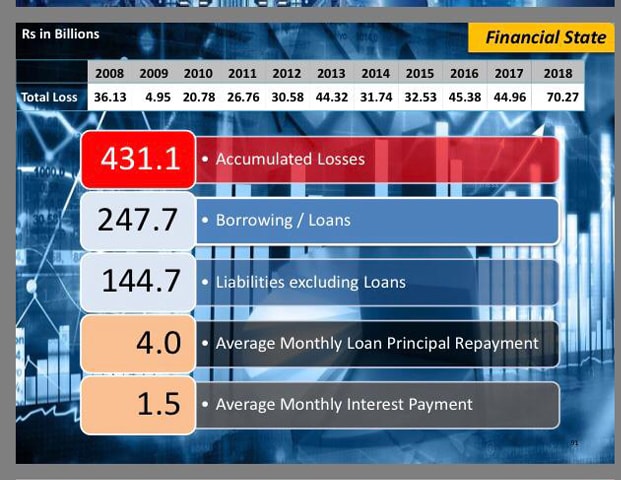Five-year revival plan for PIA by March, promises CEO

ISLAMABAD: Pakistan International Airlines (PIA) will submit a five-year ‘Strategic Business Plan 2019-2023’ to the government by March.
Addressing a press conference on Tuesday, PIA CEO Air Marshal Arshad Malik said the plan, currently being developed, consists of cost-cutting and revenue generation through detailed analysis of the market, right sizing operations, work centre, flights and routes for the revival of the national carrier.
PIA’s financial restructuring will be carried out through government support and at the same time the current fleet will be reviewed and purchase of new aircrafts will be decided, he said.
Explaining PIA’s financial health, he said the current operational losses are at Rs3 billion per month but this bleeding would be successfully plugged. The accumulated losses have risen to Rs431.1bn, while loans/borrowings have touched Rs247.7bn.
The government will announce a new aviation policy in February to boost PIA’s business, he said. Prime Minister Imran Khan has assigned the task of drafting a new aviation policy to Privatisation Minister Mohammad Mian Soomro and the Secretary Aviation.
The Open Skies policy of the previous governments brought losses to the national carrier, Mr Malik said. The government has already decided in principle to end the open skies policy.
“PIA’s 550 weekly international flights were brought down to 101 flights. Foreign carriers took away the business from 101 flights per week to 555 flights per week. These airlines are supported by their respective governments, particularly the Gulf carriers which get fuel subsidy whereas PIA does not get any subsidy. How can PIA compete with other airlines in the market,” he questioned.
He claimed to have taken “bold steps” for cost cutting. Duration of flights to Europe will now be reduced by an hour as a result of flying over the territories of Iran and Turkmenistan. Previously, all Europe-bound PIA flights avoided flying over these two countries just to avoid payment of fee to the civil aviation agencies of Iran and Turkmenistan, resulting in extra consumption of fuel. However, the matter has been resolved with the intervention of Army and PAF chiefs, he said.
On route economics, Mr Malik said PIA is under compulsion to operate flights to Gwadar, Turbat, Panjgur and Saidu Sharif routes whether or not these routes make a profit. “The annual loss on operating flights on socio-economic routes amounts to Rs452 million,” he said.

Sharing details, Mr Malik said that in addition to the Roosevelt Hotel in New York, there are another 23 properties owned by PIA in Tashkent, Tehran, New Delhi, Bombay, New York, Copenhagen and Amsterdam.
“These properties have been abandoned and virtually forgotten,” he said. “Assistance of the Foreign Office has been sought to engage ambassadors in these cities to evaluate these properties. Either these properties would be disposed off or will continue as source of income,” the CEO added.
At the press conference, the CEO said that flights on seven international routes have been stopped since these were costing Rs500m to the airline. “PIA had been facing losses on these routes for a long period,” he said. Citing the example of Islamabad-Beijing-Tokyo-Beijing-Islamabad route, he said an aircraft would be blocked for five days, with resting of crew members for equal number of days. Moreover, on the Tokyo-Beijing flight, PIA was allowed to pick only 80 passengers on a 350-seat aircraft, he added.
As part of cost-saving operations, PIA has now introduced five new international routes including Islamabad-Doha-Islamabad, Karachi-Jeddah-Karachi, Multan-Muscat-Multan, Sialkot-Sharjah-Sialkot, Peshawar-Al Ain-Peshawar and Lahore-Bangkok-Kuala Lumpur-Karachi.
“In these routes, PIA is getting 95pc seat occupancy. Aircraft from loss-making routes have been shifted to profitable ones.”
On the occasion, the privatisation minister announced that PIA will start Peshawar-Kuala Lumpur flights from April.
Published in Dawn, January 16th, 2019













































